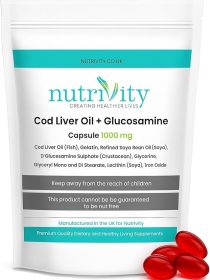Is cod liver oil or glucosamine better for joints?
Cod Liver Oil vs. Glucosamine: Unveiling the Best Joint Health Solution
Cod Liver Oil vs. Glucosamine: Unlocking the Secrets to Healthy Joints
Introduction:
Maintaining optimal joint health is a crucial aspect of overall well-being, especially as we age. Cod liver oil and glucosamine are two popular supplements often touted for their potential to support joint health. In this article, we’ll delve into the benefits and drawbacks of each, helping you make an informed decision about which might be the better option for your joints.
Cod Liver Oil And Glucosamine
Cod Liver Oil for Joint Health:
CodLiver oil is a nutrient-rich supplement derived from the livers of cod fish. It is a natural source of omega-3 fatty acids, particularly eicosapentaenoic acid (EPA) and docosahexaenoic acid (DHA), along with vitamins A and D. Omega-3 fatty acids have anti-inflammatory properties that can potentially reduce joint inflammation and alleviate discomfort. Vitamin D, on the other hand, plays a role in calcium absorption, supporting bone health and potentially reducing the risk of joint-related issues.
Glucosamine and its Role:
Glucosamine is a compound found in the cartilage of our joints. It is a building block for joint cartilage and helps maintain its structural integrity. Glucosamine supplements are often derived from shellfish and are available in various forms, including glucosamine sulfate, glucosamine hydrochloride, and N-acetylglucosamine. Many believe that supplementing with glucosamine can support the body’s natural cartilage repair processes and improve joint mobility.
Comparing the Two:
When deciding between cod liver oil and glucosamine for joint health, it’s essential to consider your specific needs and preferences. Cod liver oil’s omega-3 fatty acids offer anti-inflammatory benefits that can potentially alleviate joint pain and stiffness. Vitamin D contributes to bone health, which is closely linked to joint well-being.
On the other hand, glucosamine directly supports the structure of joint cartilage. By providing the building blocks necessary for cartilage repair and maintenance, glucosamine may be particularly beneficial for individuals dealing with osteoarthritis or age-related wear and tear on joints.
Synergy: The Combined Approach:
In some cases, combining cod liver oil and glucosamine supplements may offer a comprehensive approach to joint health. The anti-inflammatory properties of omega-3 fatty acids in cod liver oil, along with glucosamine’s support for cartilage structure, could create a synergistic effect, potentially leading to improved joint comfort and mobility.
Considerations and Precautions:
Before incorporating any new supplements into your routine, it’s crucial to consult a healthcare professional, especially if you have underlying health conditions or are taking other medications. While cod liver oil and glucosamine are generally considered safe for most people, potential interactions or allergies should be carefully considered.
Understanding the Battle of the Supplements
When it comes to promoting joint health, the debate between cod liver oil and glucosamine has long been contested. Both supplements offer potential benefits, but which one reigns supreme? Let’s delve into the science to uncover the truth.
Cod Liver Oil: Nature’s Nourishment for Joints
Cod liver oil, rich in omega-3 fatty acids and vitamin D, boasts anti-inflammatory properties that can alleviate joint pain and stiffness. Its omega-3 content helps reduce inflammation, while vitamin D supports calcium absorption for stronger bones – essential for joint health.
Glucosamine: Building Blocks for Joint Support
On the other hand, glucosamine is a natural compound found in cartilage and plays a crucial role in maintaining joint integrity. Supplementing with glucosamine may support cartilage health and cushioning, potentially easing joint discomfort and enhancing mobility.
The Verdict: Tailoring Treatment to Individual Needs
Ultimately, the effectiveness of cod liver oil versus glucosamine varies from person to person. Factors such as age, diet, and the severity of joint issues can influence which supplement may offer the most benefit. Consulting with a healthcare professional can provide personalized guidance on the best approach for joint health.
Embracing a Holistic Approach to Joint Wellness
For comprehensive joint support, consider incorporating both cod liver oil and glucosamine into your regimen. Their unique mechanisms of action complement each other, potentially offering synergistic benefits for joint health and mobility.
Conclusion:
In the quest for optimal joint health, both cod liver oil and glucosamine offer distinct benefits. Cod liver oil provides anti-inflammatory properties and essential vitamins, while glucosamine supports cartilage structure and repair. Ultimately, the choice between these two supplements depends on your specific needs and preferences. For a comprehensive approach, you might consider consulting a healthcare provider and exploring the potential synergy of using both supplements.
Whether you opt for cod liver oil, glucosamine, or a combination of both, prioritizing joint health is key to maintaining an active lifestyle. By understanding the benefits of each supplement and tailoring your approach to individual needs, you can take proactive steps towards optimal joint wellness.
- Cod liver oil vs. glucosamine for joint health
- Omega-3 fatty acids and joint inflammation
- Benefits of vitamin D for bones and joints
- Glucosamine for cartilage repair and mobility
- Combining cod liver oil and glucosamine
- Joint health supplements for osteoarthritis
- Choosing between cod liver oil and glucosamine
- Joint discomfort relief with natural supplements
- Best supplements for joint pain and stiffness
- Cod liver oil vs. glucosamine for joint pain
- Benefits of cod liver oil for joint health
- Glucosamine supplements for arthritis relief
- Comparing cod liver oil and glucosamine for joint stiffness
- Which is better for joints: cod liver oil or glucosamine?
- Cod liver oil and glucosamine synergy for joints





